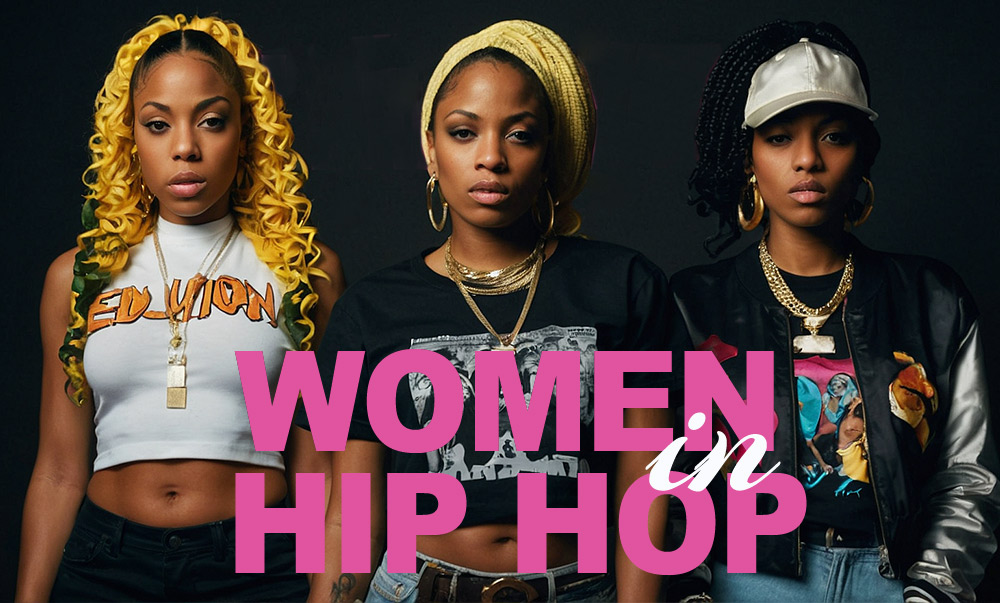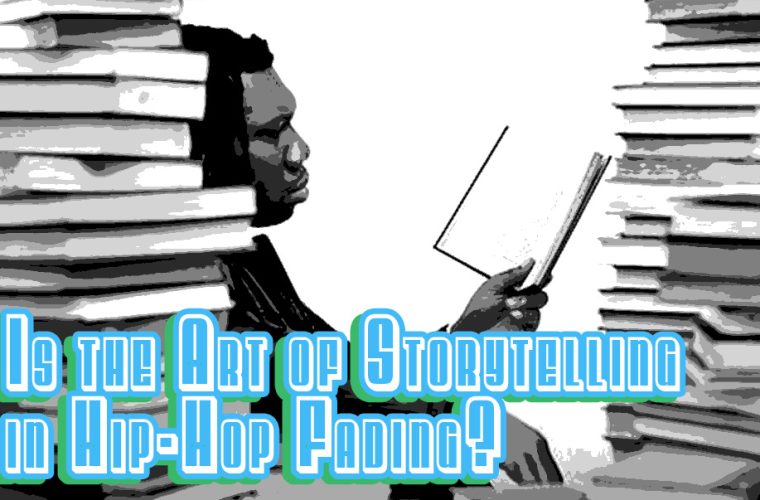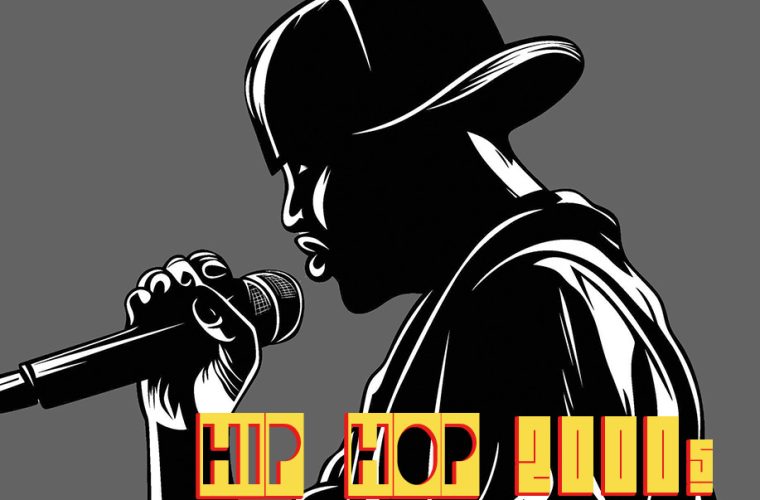
From hip-hop’s origins in the 1970s Bronx to the global phenomenon it is today, hip hop has been shaped and influenced by pioneering women who have defied expectations in a male-dominated industry. While male rappers like Grandmaster Flash, Big Daddy Kane, Kurtis Blow, LL Cool J, Public Enemy, Rakim, Run-DMC, NWA, and many others took the spotlight in the early years, a resolute handful of female MCs were kicking down doors and cementing their place on the mic.
Laying the Foundation
Among the first ladies to make waves was Mercedes Ladies, formed in 1979. Made up of Sundance, Shaheeda, and Monease, the trio was unlike anything seen before – boldly feminist rhymes delivered over hard-hitting beats. While they failed to gain mainstream traction, their uncompromising attitude and exploration of subjects like sexuality laid the groundwork for future female rappers.
Continuing to blaze that trail was Sha-Rock, who emerged as one of the first female emcees on the scene in the late 1970s as a member of the legendary Funky Four Plus One crew. With her powerful voice and commanding stage presence, Sha-Rock was a celebrated figure in the earliest days of hip-hop.
Born Sharock Shanique Cockrell and raised in the Bronx River Houses projects, she fell in love with the energetic performances of artists like Grandmaster Flash early on. She formed an all-female crew called Bingo Kids before joining up with the Funky Four, bringing an electrifying new dynamic to their shows.
Sha-Rock stood out not just for her skills but her absolute confidence and audacious spirit in a male-dominated space. As she performed during the crew’s famed routines, she could go bar-for-bar with any man while exuding a cool, unflappable swagger. Her brash lyricism covered everything from party cuts to consciousness-raising themes.
In many ways, she represented the bold new wave of women who refused to be marginalized or labeled gimmicky within the blossoming culture. Sha-Rock understood the power she wielded as hip-hop’s first prominent female voice and used her platform to uplift other women and address social issues.
Her impact went beyond recorded music into graffiti and b-girl dancing, making her an all-around foundational figure. After the Funky Four disbanded, Sha-Rock remained an esteemed gatekeeper of the culture who nurtured and inspired the gender-breaking emcees who followed. Hailed as the “Mother of the Movement,” her trailblazing spirit made generations of women in hip-hop possible.
Roxanne Shanté, The young rap prodigy from the Queensbridge projects made waves in 1984 at just 14 years old with her viral diss track “Roxanne’s Revenge,” firing back at UTFO’s misogynistic “Roxanne, Roxanne.” Her precocious skills established her as one of the most talented rappers of her era, regardless of gender. She became a regional star and opened doors for other female MCs.
One of the earliest solo female rappers to achieve widespread success was MC Lyte who burst onto the scene in 1988 at age 17 with her debut album Lyte as a Rock. With her precise flow and literate messaging, she earned respect in the male-dominated hip-hop world through hits like “Paper Thin” and “Ruffneck.” Lyte became known as the “First Lady of Rap” and a pivotal voice for female empowerment.
Salt-N-Pepa also burst through in the late 80s, announcing their arrival with a brash, in-your-face style on hits like “Push It” and “Tramp.” Cheryl “Salt” James, Sandy “Pepa” Denton and Deidra “DJ Spinderella” Roper celebrated female sexuality and strength in a way that was still rare at the time. Their Grammy-winning success kicked the door open wider, making way for future artists to embrace femininity within their artistry.
Queen Latifah’s debut album All Hail the Queen in 1989 was a critical smash, generating hits like “Ladies First” and establishing her as hip hop’s reigning queen and feminist standard-bearer. Her powerful image and lyrical skills commanded respect in a way that shattered preconceived notions of what a female rapper could be.
Representing the West Coast, Yo-Yo rose to fame in the late 80s as well. She was a member of Ice Cube’s rap crew I.N.X. Her tomboy, streetwise persona and socially conscious lyrics made her a unique voice on seminal albums like Make Way for the Motherlode. She later launched a successful solo career, reaching new heights as a representative for hip-hop feminism.
Emerging From the Shadows
The 1990s saw female rappers emerging from a large shadow cast by their male counterparts as the genre skyrocketed in mainstream popularity. From West Coast stars like MC Lyte and The Lady of Rage to East Coast firebrands Lil’ Kim and Foxy Brown, women co-opted and reclaimed the raunchy, provocative themes that were standard fare for male rappers.
While she drew criticism for the overt sexuality of her rhymes, Lil’ Kim in particular left an indelible mark. Her unabashedly raw lyrics about female sexuality made her a feminist lightning rod but also a pop culture icon. Her debut album Hard Core went triple platinum, illustrating that rap’s female vanguard could connect with audiences just as powerfully as men.
LA-raised, The Lady of Rage was one of the hardest female rappers back in the 90s. She struck a defiant pose alongside Dr. Dre, Snoop Dogg, and others. Her gritty, hard-edged delivery and no-nonsense lyrics cut through the masculinity of gangsta rap. She made a name for herself on Dre’s The Chronic before her acclaimed solo debut Necessary Roughness.
Da Brat was one of the first mainstream solo female rappers to go platinum with 1994’s Funkdafied, Da Brat was a trailblazer from the West Side of Chicago. Her sexually confident, in-your-face lyricism and collaboration with Jermaine Dupri on So So Def shaped the path for future raunch rappers.
Redefining The Game
As the 90s gave way to a new millennium, hip-hop’s female vanguard continued redefining what was possible for women in the genre. One artist who left an indelible mark was Eve, the fierce Philadelphia rapper who ruled the turn of the century.
Born Eve Jeffers, she burst through in 1999 as the sole female member of the Ruff Ryders collective. Her debut album Eve: Ruff Ryders’ First Lady was a powerful statement of arrival backed up by her gritty, no-nonsense flow and mentored lyricism from DMX and Swizz Beatz.
What separated Eve from her predecessors was her ability to straddle the line between hardrock swagger and mainstream crossover appeal. Songs like “Gotta Man” and “Let Me Blow Ya Mind” with Gwen Stefani showcased her versatility in seamlessly moving between hardcore and pop realms.
Her laid-back Philly confidence and street-forged authenticity sold both her rugged rap persona and her stylish, trendsetting impact on urban fashion. Unafraid to get gritty or glam up, Eve’s fluidity between seemingly opposing modes became her trademark.
At the height of her fame, she pivoted to acting, landing roles like Terri Jones in the Barbershop films. But it was her collaboration with hip-hop titan Dr. Dre that made her a true multi-platform pioneer.
Eve’s Ruff Ryder roots and bona fide skills cemented her credibility in the rap industry while her crossover savvy opened doors for the inclusive, genre-blurring environment we see today. Her unapologetic embrace of her multitudes embodied the unlimited possibilities available for the new generation of women in hip-hop culture.
Expanding Boundaries
The 21st century opened up new avenues for women in hip hop. Lauryn Hill’s dynamic performance in The Miseducation of Lauryn Hill highlighted her incredible versatility and ability to uplift and empower through socially conscious lyrics. The album was a commercial juggernaut and opened doors for a wider range of female rappers to share their experiences and perspectives.
Missy Elliott shattered boundaries as a writer, producer, and innovative visual storyteller who celebrated body positivity and rejected stereotypes about how rappers should look and sound. Meanwhile, Nicki Minaj achieved unprecedented success as one of the best-selling and most-streamed rappers of all time, fusing edgy rhymes with a cutting sense of humor and larger-than-life wigs and costumes. Her alter egos allowed her to inhabit different identities and relate to fans in deeply personal ways.
Carrying the Torch for Lyricism
While most mainstream artists today have achieved success through viral antics or ear-catching beats, North Carolina’s Rapsody has firmly cemented her place through an unwavering commitment to pure, uncompromising lyricism. The MC born Marlanna Branden has become one of the most respected and critically-acclaimed rappers of her generation.
Rapsody’s stock had been rising steadily through guest verses and her She Got Game album, but it was 2017’s Laila’s Wisdom that fully displayed the depth of her artistry. A spiritual and biographical tour-de-force, it wove together vignettes about Black womanhood, cultural legacy, and her upbringing through a jazz-infused sonic palette.
With her intricate rhyme patterns, clever wordplay, and ability to craft cinematic visuals through her incisive pen, Rapsody drew comparisons to hip-hop’s most esteemed lyrical technicians like Nas and Black Thought. Like the greats before her, she has a knack for naturalistic storytelling that brings her narratives vibrantly to life.
On her latest opus, GOATED, Rapsody’s finely-etched lyrics achieve a new level of transcendence. She inhabits various personas to weave multi-layered tales examining the complexities of the Black American experience with raw vulnerability and searing social commentary.
In an era when mumblings and ad-libs often take precedence over actual rapping, Rapsody has firmly established herself as one of the preeminent wordsmiths carrying the torch for traditional hip-hop lyricism. Her respect for the culture’s foundations has also led her to pay homage through albums like Eve and Kendrick Lamar-assisted freestyle sequences.
With each successive body of work, Rapsody has raised the bar for contemporary rappers in creating substantive, meaningful art that resonates beyond mere carefree bangers. Her uncompromising creative vision has cemented her status as a modern-day pioneer keeping hip-hop’s culture of brilliant wordsmithing vibrantly alive.
NYC-based underground icon Jean Grae has also cultivated a cult following through her dizzying lyrical dexterity and unique artistry blending elements of jazz, soul, and golden age hip-hop. Her cerebral, progressive style has inspired a generation of alt-rappers.
Today’s Reigning Queens and Newcomers
In the present day, hip hop’s female vanguard continues to push the culture forward with bold, genre-blurring artistry that runs the gamut from introspective storytelling to brash club bangers. At the forefront is Nicki Minaj, who has solidified her place as one of the biggest stars in music.
The Trinidad and Tobago-born, Queens-raised rapper has parlayed her unique blend of undeniable talent, eccentric persona, and business savvy into becoming a mainstream juggernaut. Her breakout verses on monster hits like “Monster” and “Bang Bang” showcased her dexterity as both a technically gifted and flamboyantly animated rhymer and performer.
Nicki’s ability to seamlessly blend rap & pop with her “over-the-top braggadocio” has allowed her to cultivate a fiercely devoted fanbase while achieving rarified commercial success. Her debut album Pink Friday went triple platinum, while segueing into her chameleonic ability to reinvent herself.
Like her predecessors, she has embraced and owned her sexuality on her own terms while achieving mainstream success – defying those who said female rappers couldn’t be openly sexual and still be hugely popular.”
She has taken this boundary-pushing approach to celebrating female sexuality while still managing to become one of the biggest, most commercially successful rappers – disproving the notion that women can’t be provocative or raunchy and still resonate with a wide mainstream audience. Her Grammy nominations and Billboard chart domination defies all who said female rappers couldn’t achieve that level of broad appeal.
Cardi B has emerged from the Bronx as another one of hip-hop’s crossover champions. The former stripper’s unapologetic lyrics, undeniable charisma and business acumen have powered anthems like “Bodak Yellow” and “WAP” into chart-dominating hits.
Meanwhile in Houston, Megan Thee Stallion has created a bold, confident brand of “hot girl” feminism with her explosive brand that celebrates sexuality, financial independence, and not giving a damn about respectability. Her freaky anthems like “WAP” (with Cardi B) and “Savage” made her a household name, not just within hip hop but across popular culture.
Megan’s clever, meme-worthy wordplay and expertise in capitalizing on viral moments has allowed her to cultivate a devoted online fan base. Her journey from student at Texas Southern to globally touring superstar has further resonated as an inspirational example of self-belief and Black girl magic.
In the UK, Little Simz has risen as one of the preeminent voices in hip-hop, earning widespread critical acclaim for her dexterous flow and powerful socially-conscious messaging. The North London emcee’s penmanship is uncompromising yet cinematic on albums like Sometimes I Might Be Introvert, vividly portraying the modern Black experience with grit and grace.
Simz’ jazz-infused sound and avant-garde visuals invoke the boundary-breaking spirit of iconoclasts like Lauryn Hill and Erykah Badu. Yet she remains fiercely original, blending cutting commentary on injustice with hard-earned lessons on love, resilience and self-acceptance. Her complex artistry has made her a standard-bearer for a new generation of radical truth-tellers.
Also representing a more pensive, socially-conscious perspective is Noname, the introspective wordsmith who explores deeply personal themes of identity, racial injustice and radical politics on albums like Room 25. Her cerebral, jazz-inflected rhymes mark her as the poetic heir to pioneers like Lauryn Hill while infusing that consciousness with a modern, youthful vitality.
Back in the US, Memphis upstart GloRilla has taken the world by storm with her animated flow and raunchy, braggadocio-filled rhymes. The viral sensation behind hits like “F.N.F” has brought renewed attention to the gritty, hyper-regional sound of her city’s hip-hop underground. GloRilla’s unapologetic, high-energy persona and sticky ad-libs have made her the leader of a new era of ratchet rap stars.
Atlanta rapper Latto, Formerly known as Mulatto, overcame controversy over her previous moniker to become a streaming force with her melodic flow and raunchy yet resonant tales of pimp life over hits like “Bitch From Da Souf” and “Big Energy.”
Doechii is another one whose dynamic vocals and hybrid rap/sung style sparked buzz with the TDE signee’s EP Oh The Places You’ll Go. Doechii’s unconventional artistic vision and self-assured individuality have earned her a devoted cult following eager to see where her forward-thinking artistry goes next.
Alabama upstart, Flo Milli has made waves with her rapid-fire, tongue-twisting delivery and brash, in-your-face rhymes about her skills and sexuality. With viral hits like “Beef FloMix” and “Roaring 20s,” Flo Milli brings a new age Southern bounce to conventionally masculine themes of braggadocio and ratchetry.
Doja Cat, The genre-blending LA rapper/singer has also burst onto the scene with viral hits like “Mooo!” and “Say So.” Her versatile flow and eccentric visuals/persona have made her a true crossover star, able to straddle rap, pop, and R&B effortlessly. Albums like Planet Her showcase her thoughtful lyricism alongside razor-sharp punchlines.
Hailing from New York, Lola Brooke has quickly become one of the Industry’s hottest new prospects powered by her raw, breathless delivery and knack for punchy punchlines. The Brooklyn-bred emcee’s unfiltered charisma shines through on tracks like the head-nodding “Don’t Play With It” and “Here I’ll Share,” displaying a effortless toughness and realism reminiscent of NYC’s Golden Era greats.
In different ways these women are all staking their claim as leaders of an emboldened new generation.
Women continue to evolve hip hop by infusing it with their unique voices, experiences and perspectives. While there is still progress to be made in our industry that remains predominantly male, the tireless efforts of generations of female MCs have etched their names into the canon and established that hip hop is undeniably their domain as well.



